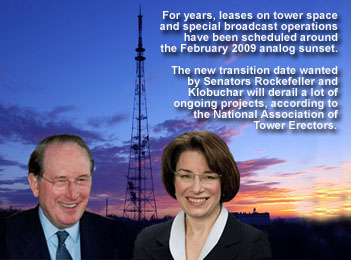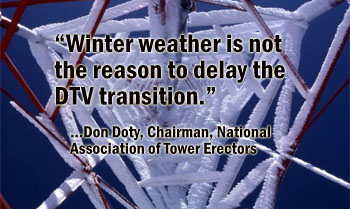|
Tower crew safety disputed as a reason to delay February 17 DTV transition deadline
January 17, 2009 - Two Democratic senators Thursday introduced legislation that would push the DTV transition date from February 17 to June 12. One of the reasons cited was the deadline's affect upon the safety of tower climbers.
"While the digital TV transition should happen, this delay is necessary to make up for the lack of preparation on the part of the current administration," Sen. Amy Klobuchar of Minnesota said in a statement.
"I firmly believe that our nation is not yet ready to make this transition," said Sen. Jay Rockefeller of West Virginia.
Sen. Rockefeller said the delay is needed to reduce the public safety risks of losing access to emergency information, allow federal agencies to better prepare, and to allow the DTV coupon program to be fixed.
He also said that delaying the project would reduce safety risks that might cause antenna-related accidents.
"In many parts of the country the winter weather will put consumers and tower crews at risk if the transition occurs on February 17th," said Sen. Rockefeller.
His concern for the tower construction and maintenance industry is admirable, said a broadcast tower worker who frequently installs antennas in below zero temperatures, but found the legislator's comments to be a red herring.
"It's interesting that all of a sudden you have a senator that is very concerned about our safety and welfare. If he wants to do something about safety, have him get his people to look at why many tower owners will hire unqualified and likely unsafe workers just because they'll only accept the low bid," he said.
NATE finds statement to be misleading
Don Doty, Chairman of the Board of Directors of the National Association of Tower Erectors, also found the senators' statement regarding winter weather work to be disingenuous.
"It is true, tower crews work in winter weather all the time, just as I did for over 20 years. Work does not stop just because the temperature goes down. When tower lights quit working in the middle of winter, someone has to make the repair. When a station is off the air, a tower crew must effect repairs to get the station back on the air," Doty said. station is off the air, a tower crew must effect repairs to get the station back on the air," Doty said.
"Winter weather is not a reason to delay the DTV transition. To someone unfamiliar with working outdoors, that answer would seem perfectly feasible. Just as in other outdoor industries or recreational activities, special clothing and precautions are needed to safely climb and service towers. Weather affects all outdoor activities, but to simply state workers are at greater risk is misleading and inappropriate," said Doty.
NATE is also concerned about the economic impact a delay will have upon broadcast antenna manufacturers, transmission line suppliers, tower manufacturers and literally hundreds of service firms throughout the country that have planned for and deployed assets to meet the requirements of the digital transition.
Some of their members are sending letters to members of Congress and the Administration recalling how they were severely impacted when Congress enacted the first delay in 2002.
At that time, according to NATE Executive Director Patrick Howey, contracted work was halted and entire companies folded or merged with others, just to survive. Throughout the industry, specially trained laborers, technicians, managers, salesmen and project managers lost their jobs.
Their letters also state that by delaying the transition further, many millions of dollars will be wasted in unnecessary additional costs while simultaneously damaging their industry and increasing the potential for job losses in an already fragile economy.
More funding may not be the answer
The government's $1.34 billion coupon program for digital converter boxes has run out of money.
Anybody requesting a $40 coupon to offset the cost of buying a converter box for digital TV will now be placed on a waiting list, says Meredith Baker, acting head of the Commerce Department's National Telecommunications and Information Administration.
How long will people have to wait? "I don't know," Baker told reporters on a conference call last week. Already, two million people are on the list.
Doty said that noticeably absent is the question, are there enough DTV converters? He believes it is not a funding issue.
"I haven't heard anyone report they are running out of DTV converters. Un-redeemed converter coupons is the real reason there is a waiting list for coupons. Some people mistakenly obtained converter coupons only to realize later they did not need them. I suggest many threw the coupons away with no intention of redeeming in the future. That is why only a portion of the coupons have been redeemed. So, converters sit waiting for customers. The money Congress already authorized is available for coupon redemption," said Doty.
"Since a large percentage of the coupons won't be redeemed and the converters are available, NTIA just needs to print more coupons. It makes sense to me the budget is probably just fine. If more converters were needed, then that would require a budget change," said Doty.
As president of one of the nation's leading broadcast tower manufacturers, Stainless LLC, Doty has been intimately involved in working with broadcasters throughout the nation to meet the current deadline.
"The transition has been carefully planned for years. Will there be challenges when analog goes away? Of course there will. Some people just haven't been paying attention as with any major change. A delay of any amount is not going to make the transition easier. Look, Congress mandated this change and broadcasters responded and now it's crunch time. Now is not the time to second guess the plans that have been made," Doty said.
In a letter to Representative Joe Barton of Texas, the ranking Republican on the House Committee on Education and Commerce, Commerce Secretary Carlos Gutierrez said further delaying the digital changeover "would cause confusion and would undermine the public outreach that has resulted in near-universal awareness" of the Feb. 17 deadline.
Gutierrez called on Congress to allot an additional $250 million - an amount roughly equal to the value of unused coupons set to expire by March 31. That would allow the NTIA to quickly issue more coupons, then recoup the funds after the older coupons expire.
Hawaii changeover has expected hitches
On Thursday, Hawaii became the first state to switch to digital TV. The month early changeover was because broadcasters and park rangers wanted to take down analog transmission towers on the slopes of Maui's Haleakala volcano before an endangered bird's - the Hawaiian dark-rumped petrel - nesting season.
And now that it has gone all digital, the state is getting a close scrutiny from the rest of the country as it awaits the nationwide switchover from analog to digital TV signals.
So far, as expected, not everything is going smoothly. Residents lit up special TV help center phone lines that had been set up by the Federal Communication Commission and broadcasters. By the time evening fell on the first day of digital broadcasting, calls were coming in at nearly 100 an hour.
Officials monitoring the switchover say most of the calls that have come in so far are from those who didn't prepare in advance for the changeover.
A minute-long message appeared on analog sets that informed viewers that "All full-power TV stations are now digital." It was followed by a seven-minute video announcement that will loop for the next several weeks, dubbed by technicians as the "analog night light."
Volunteers and contractors were making house calls to residents having trouble with their converter boxes, but no statistics have become available regarding the number of people that wanted, but were unable to get a converter box.
Even though most viewers in Hawaii -- almost 90 percent -- have cable and weren't affected, Hawaii has been viewed as a test case for the rest of the nation.
|